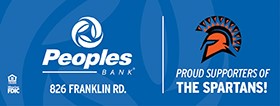College Information for Students with Disabilities
About Our School
Contact/Directions
Principal's Corner
Parent/Student Resources
News & Announcements
Scheduling & Program of Studies
Clubs & Organizations
Curriculum
Graduation Events
Health Services
Report Bullying
SaferSchools Ohio
Summer Assignments
Teacher Websites
The Waynesville Way
College Information for Students with Disabilities
College Resources for Students with Disabilities
Career Guide for Students with Disabilities
8 Steps for Learning Disabled Students Who Want to Go to College
(According to US News-Best Colleges Report) By Kim Clark Posted December 2, 2010
- Most of the 3 percent or so of teens who have been diagnosed with learning disabilities struggle so much in their high school classes that they give up on hopes of college, setting back their job and career prospects, according to statistics compiled by the National Center for Learning Disabilities.
But there are new reasons for hope for anyone with attention deficit disorder, dyslexia, or other common learning challenges. A growing number of colleges, services, and technologies are helping students earn admission to, and diplomas from, college, counselors say.
College admissions officers and learning disability counselors from around the country say leaning disabled students interested in college should follow these 8 steps:
- Start preparing early. Many students, parents, and high school officials think struggling students should be shifted to easier classes. But starting in freshman year, anyone hoping for college should try to stick with college prep classes, says Dianne Rogers, director of learning differences at Mercyhurst College in Erie, Pa. "Avoid the temptation to retreat to lower track classes," she says. College courses are hard. Students who have been waived from high school algebra and other tough courses probably don't have the knowledge or skills to be admitted to four-year colleges. Those who skip rigorous classes in high school could have to spend a couple of years in remedial courses in community college, she says. Besides, high school is the best time for students to develop time management, test-taking, and studying strategies that they'll need in college and beyond.
- Experiment with technology. From simple spell check and calendar software programs to dictation software, screen readers, and new high-tech recording pens, there's a growing abundance of tools to help students retain information and finish homework on time, says Rogers.
- Be creative. Students who just can't succeed in some required courses can look for substitutes. For example, those whose learning disability makes it difficult to keep up in foreign language classes can try switching to something like American Sign Language, says Nancy Singer, assistant director for admissions and recruitment for the Strategic Alternative Learning Techniques (SALT) Center at the University of Arizona
- Put the student in charge. High schools develop special learning plans for students with documented disabilities. But colleges don't typically provide any special help unless students—not parents—know exactly what they need and know how to ask for it. "Students have to be ready to have an adult conversation about what they need" such as note takers or special software, says Jane Daigneault, coordinator of disability services at Clark University in Worcester, Ma. High school is a good time for parents to let students experience the repercussions of small failures so that, for example, they learn to follow their medication regime, she says.
- Carefully research college options. Make sure the college fits the student's unique learning style. Singer recommends three books: The K & W Guide to Colleges for Students with Learning Disabilities or Attention Deficit Disorder, Preparing Students With Disabilities for College Success, and Peterson's Colleges With Programs for Students With Learning Disabilities or Attention Deficit Disorders. USNews.com also includes information on each college's learning disability services in its Best Colleges premium service.
- Update the documentation on your learning disability. Students who want accommodations from their colleges must have documentation confirming the diagnosis that is generally no more than one or two years old, college officials say.
- Accentuate the positive. Applicants aren't required to inform colleges of their learning difficulties, and many students keep quiet for fear of hurting their chances of admission. Federal law bans colleges from discriminating based on disability, but it doesn't require colleges to give any special admission breaks to learning disabled students. Many admissions officers, including David Hautenan, associate dean of admissions at Northeastern University in Boston, say, however that students who can explain a bad grade or test score, or who use their application essays to show how they've overcome their challenges and "developed resiliency," improve their chances of admission.
- Consider extra help. A few colleges, such as Fairleigh Dickinson University in Teaneck, N.J., offer extra counseling and tutoring to learning disabled students at no extra charge. But most colleges charge anywhere from a few hundred dollars to $3,000 per semester for extra support for learning disabled students. Grants and scholarships to cover those extra costs are scarce. Some students are able to persuade their state's vocational rehabilitation offices to pay for the extra services, though. Colleges add the extra fees into the student's total cost of attendance so that the students or parents can qualify for larger loans.


